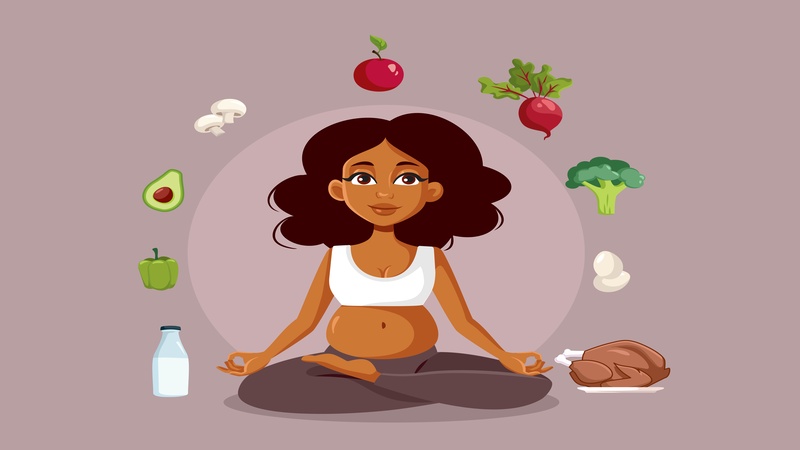
Experiencing motherhood is a blessing for women, but this excitement and happiness will convert into anguish and agony when an expecting woman faces a miscarriage. Miscarriage is spontaneous termination of pregnancy without any effort before the 20th week. According to the research of the American College of Obstetricians and Gynecologists (ACOG), miscarriage is the most prevalent type of pregnancy loss. It is important to understand the miscarriage symptoms.
There are many factors that trigger miscarriage. Some women experience recurrent miscarriages. In that case, it is important to find the root cause and treat it. This article sheds some light on the causes and signs of miscarriage and ways to prevent it.
What is a Miscarriage?
Miscarriage is a term that refers to a pregnancy that annuls on its own before the 20th week of pregnancy. This is an accident that arises naturally without any medical abortion or surgical abortions. As per the studies were done by March of Dimes, 50% of pregnancies are abolished because of miscarriage. Out of them, some occur before the realization of the woman that she is pregnant. (1)
Signs And Symptoms Of A Miscarriage

The major signs and symptoms of Miscarriage are (2) :
- Brown or bright red Vaginal Bleeding
- Pelvic Pain
- Severe Cramps
- Fever
- Abdominal Pain
- Weakness
- Back Pain
- Weight Loss
- White, pink mucus
- Tissue with clots
- Passage of clots with fleshy mass
What Causes Miscarriage?

Miscarriages are caused due to various factors, like:
1. Chromosomal Disabilities
the chromosomal or genetic abnormalities can be due to genetic abnormalities in parents or can be due to trisomy found in the fetus itself due other factors. This happens mainly in the first trimester (3).
2. Possibilities Trimester Wise
Possibilities of a Miscarriage Happening in the First Trimester are:
- Drug and Alcohol abuse
- Hormone Problems
- Smoking
- Excessive caffeine
- Maternal Age
- Maternal Trauma
- Malnutrition
- Obesity
- Problem with mother’s reproductive organ
- Infection
- Exposure to environmental toxins
- Uncontrolled diabetes
Possibilities of Miscarriage in the Second Trimester are:
- High blood pressure
- Lupus
- Kidney disease
- Thyroid problems
- Rubella
- Cytomegalovirus (CMV), Bacterial Vaginosis (BV), Polycystic ovary syndrome (PCOS)
- Sexually transmitted infections like HIV, Chlamydia, Syphilis, and Gonorrhoea
- Malaria
- Food poisoning
- Fibroids
- Womb structure problems
- Weakened cervix
The risk of miscarriage is higher in women of older age. Women under the age of 35 years have a 15% chance. Women between the age of 35-45 yrs have a 20-35% chance and Women more than the age of 45 years has a 50% chance. Apart from this, a woman who has had previous records of miscarriage has a higher risk of miscarriage (4).
[Read: Blighted Ovum (Early Pregnancy Failure)]
Different Types of Miscarriage

In this type of miscarriage, the fertilized egg embeds barring uterus, mostly implants in the Fallopian tube. This situation requires immediate treatment otherwise could end in severe maternal complications.
1. Blighted Ovum
A fertilized egg placed itself into the uterine wall, but does not start fetal development, this miscarriage is also known as embryonic pregnancy (5).
2. Complete Miscarriage
In Complete miscarriage, the embryo has completely come out of the uterus and causes too much bleeding. This miscarriage can be settled by surgical curettage or ultrasound.
[Read: Everything About Molar Pregnancy]
3. Molar Pregnancy
In this type of pregnancy, it is benign tumor of the uterus which causes due to abnormal placentation and non viable pregnancy (6).
4. Inevitable or Incomplete Miscarriage
In Inevitable miscarriage, the tissue of pregnancy remains in the uterus, but the bleeding and back pain has begun. It is also known as an incomplete miscarriage.
5. Missed Miscarriage
It happens when women do not know about their pregnancy.
6. Recurrent Miscarriage(RM)
The situation when three or more consecutive miscarriages occur in the first trimester. This can affect 1% of couples trying to conceive (7).
[Read: Recurrent Miscarriage]
7. Threatened Miscarriage
In a threatened miscarriage, bleeding and abdominal pain occur, but the pregnancy continues (8).
Treatments For Miscarriage
The main treatment for miscarriage is (9)
- To prevent hemorrhaging or infection.
- Dilation & Curettage (D&C) is the surgical method to stop bleeding and prevent infection
- Consult your gynecologist in case of bleeding and abdominal pain for better consultation.
How to Prevent Miscarriage?

Healthy living and a healthy atmosphere is the main concept to prevent miscarriage (10).
- Regular exercise
- Eat healthy food
- Never take the stress
- Take folic acid daily
- Do not smoke or drink alcohol
- Detect and treat your disease before pregnancy (11)
- Avoid things like x-rays, caffeine intake, recreational drugs, and infectious diseases.
- Immediately contact your doctor in case of any signs and symptoms of any prenatal issues.
[Read Also: What Happens To Your Body After A Miscarriage]
FAQ’s
1. How Many Weeks Do You Have To Be To Have A Miscarriage?
You had a miscarriage if you lost your baby before 24 weeks. Miscarriages are most common in the first 12 weeks of pregnancy. Between 12 and 24 weeks, late miscarriages occur. It’s possible for a woman to miscarry in the first week or two of pregnancy before she even knows she’s pregnant. It may even seem like a late period.
2. Can Stress Cause Miscarriage?
The majority of major medical organisations do not believe that stress is a primary cause of miscarriages. Stress, on the other hand, maybe an indirect risk factor since it impacts the pregnant woman’s mental health and behaviour. For example, stress might make you want to smoke or consume alcohol, which can lead to miscarriage.
3. Which Sleeping Position Can Cause Miscarriage?
There is no correlation between the position you sleep in when pregnant and the miscarriage. The fetus is protected by the amniotic fluid and the lining of the uterus.
4. Can Hot Water Cause Miscarriage?
It is found that the probability of miscarriage rose with increasing water temperature setting. Miscarriage risk was doubled for women who used a hot tub or whirlpool bath after becoming pregnant, compared to those who did not use such a facility.
5. How Long To Rest After A Miscarriage?
After abortion within 2 to 3 days woman can perform daily activity. But if there is more blood loss then weakness can be there or if there is infection then the patient might take around 1 to 2 weeks to recover.
6. What Week Do Most Miscarriages Happen?
Miscarriage can happen in any trimester in pregnancy. But generally abortion are more common in the first 3 months of the pregnancy.
7. Why Wait 3 Months After A Miscarriage?
We should wait for 3 months to conceive next pregnancy after an abortion because a woman’s body needs 3 months to recover from the trauma of abortion. There can be weakness if there is more blood loss , uterus takes around 6 weeks to back to pre-pregnancy state.
8. How To Stop Worrying About A Miscarriage?
First thing to remember as a couple that it is not anyone’s fault that a miscarriage has happened. So people around them should not blame them and be gentle with them. If there are more than 3 miscarriages then the couple to go the infertility specialist to evaluate themselves.
References
- Jeve, Yadava B.; Davies, William1. Evidence-based management of recurrent miscarriages. Journal of Human Reproductive Sciences 7(3):p 159-169, Jul–Sep 2014. – https://journals.lww.com/jhrs/fulltext/2014/07030/Evidence_based_management_of_recurrent.2.aspx#:
- Sevi Giakoumelou, Nick Wheelhouse, Kate Cuschieri, Gary Entrican, Sarah E.M. Howie, Andrew W. Horne, The role of infection in miscarriage, Human Reproduction Update, Volume 22, Issue 1, January/February 2016, Pages 116–133 – https://academic.oup.com/humupd/article/22/1/116/2457860#:
- Raj Rai, MD Prof Lesley Regan, MD Published:August 12, 2006 – https://www.thelancet.com/journals/lancet/article/PIIS0140-6736(06)69204-0/abstract#:
- L. Bricker, R.G. Farquharson, Types of pregnancy loss in recurrent miscarriage: implications for research and clinical practice, Human Reproduction, Volume 17, Issue 5, May 2002 – https://academic.oup.com/humrep/article/17/5/1345/845544#:
- Nan Fang yi ke da xue xue bao = Journal of Southern Medical University, 01 Jul 2017, 37(7):902-906 – https://europepmc.org/article/med/28736365#:
- Valena Soto-Wright, Marilyn Bernstein, Donald Peter Goldstein, Ross S. Berkowitz, The changing clinical presentation of complete molar pregnancy, Obstetrics & Gynecology, Volume 86, Issue 5, 1995, Pages 775 779 – https://www.sciencedirect.com/science/article/abs/pii/002978449500268V#:
- Pandey, M.K., Rani, R. & Agrawal, S. An update in recurrent spontaneous abortion. Arch Gynecol Obstet 272, 95–108 (2005) – https://link.springer.com/article/10.1007/s00404-004-0706-y#:
- Joshua L Weiss, Fergal D Malone, John Vidaver, Robert H Ball, David A Nyberg, Christine H Comstock, Gary D Hankins, Richard L Berkowitz, Susan J Gross, Lorraine Dugoff, Ilan E Timor-Tritsch, Mary E D’Alton, Threatened abortion: a risk factor for poor pregnancy outcome, a population-based screening study, American Journal of Obstetrics and Gynecology, Volume 190, Issue 3, 2004, Pages 745-750 – https://www.sciencedirect.com/science/article/abs/pii/S0002937803011335#:
- Elina Hemminki, Treatment of Miscarriage: Current Practice and Rationale, Obstetrics & Gynecology, Volume 91, Issue 2, 1998, Pages 247-253 – https://www.sciencedirect.com/science/article/abs/pii/S0029784497006066#:
- S Feodor Nilsson, PK Andersen, K Strandberg-Larsen, A-M Nybo Andersen First published: 19 February 2014 – https://obgyn.onlinelibrary.wiley.com/doi/full/10.1111/1471-0528.12694#:
- Rima K. Dhillon-Smith, Pedro Melo, Rosinder Kaur, Emily Fox, Adam Devall, Natalie Woodhead, Arri Coomarasamy, Interventions to prevent miscarriage, Fertility and Sterility, Volume 120, Issue 5, 2023, Pages 951-954 – https://www.sciencedirect.com/science/article/abs/pii/S0015028223017235#:
